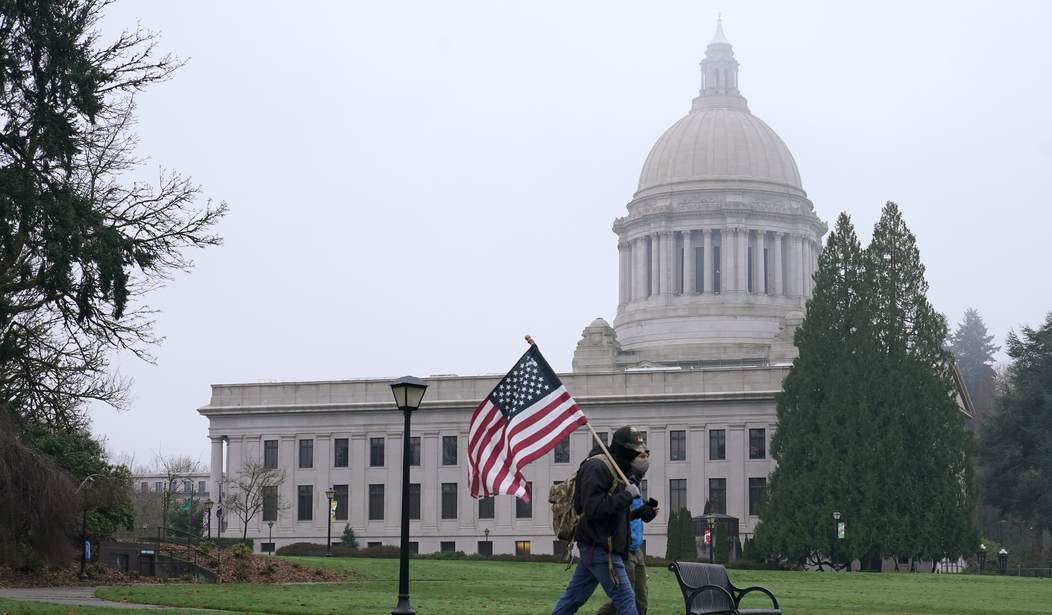The opinions expressed by contributors are their own and do not necessarily represent the views of RedState.com.
The midterm elections are safely in the rear-view mirror, and all eyes are already focused on the next races as the nation prepares to enter a new year. Speculation about the next presidential election is abundant on the airwaves and interwebs. Further, members of the chattering class are discussing which party will end up controlling both chambers of Congress in the next race.
Republicans and Democrats are readying their troops for what will be a pitched battle in the culture and government to decide which party will gain the most power in the federal government. This, while Americans are growing increasingly frustrated with their parties, which are more focused on amassing power and influence than on serving their constituents. While the thought of a third party making its way into America’s political zeitgeist has historically seemed about as improbable as Charlie Brown kicking the football, there is reason for renewed hope.
The Libertarian Party, the nation’s third-largest political party, is focusing on a long-term strategy to expand its influence in electoral politics and bring about a liberty-focused renaissance of sorts. Under its prior leadership, the party floundered, struggling to make a splash on the national scene. But now that the Mises Caucus is in the pilot’s seat, times might be a-changing for the better.
The Libertarian Party announced an electrifying new campaign, titled “Decentralized Revolution,” in which it will focus primarily on winning key positions at the local level. In its announcement, the Mises Caucus explained:
The ruling class has, with its allies in the corporate media and in academia, waged a subtle divide-and-conquer campaign against the American people over the last century or so, and it has largely succeeded. The electorate has been conditioned to identify with either Team Red or Team Blue, and to take part in a fierce political debate and life-or-death battle within a very constricted range of opinions and topics, which is sometimes called the Overton window.
The party goes on to decry what I call the “team sports mentality” that has become all too pervasive in American politics. “This team mentality is not merely political; it’s psychological and emotional,” the author notes. “To leave one’s team, which is what Libertarians are asking people to do, is to leave one’s social circle and status. This is a significant price to pay, and we have to have a compelling reason to ask people to make that sacrifice.”
The article explains that progressives have “thrived” by “pushing the Overton window to the left” because they know “conservatives lack the long-term vision and principled leadership to do anything but maybe slow things down here and there a tiny bit.”
As a result, the nation is now in a situation created by Republicans and Democrats in which anyone can affect positive change at the federal level. Even further, the author acknowledges that Libertarians have no “real reason” to believe they “can be influential at that level of politics anytime soon.”
The same appears to hold true for statewide races, in which both parties have conspired to ensure third parties are not able to gain ballot access.
As a result, the Libertarian Party has decided that focusing locally, and culturally, is the better pathway to success for the liberty movement. “A Libertarian Party by the liberty movement and for the liberty movement, with a diverse range of liberty-based projects alongside it, whether political or not, will be the backbone of our community and culture,” the article reads.
The author then lays out the realities that led to the adoption of Decentralized Revolution, noting that Libertarians had 673 candidates on ballots at the local, state, and national level in the 2022 General Election:
However, much of the time and energy expended to field these 673 candidates, to a large degree, could have been allocated more wisely. Only about 9 percent of those 673 LP candidates were for local office (lower than the county level)—yet ALL but one of the 22 LP victories were in those local races. Out of 93 county-level races, one county attorney candidate was successful. For perspective, that’s 63 local level candidates, nearly all of them city council and mayor, with 21 of them winning. That’s an astounding 33 percent of all local level candidates who won.
The article then speculates what would have happened if the “percentage was flipped,” and 75 percent of the 673 candidates were running at the local level. The author points out that at the same 33 percent success rate, this would result in 224 seats being held by liberty-minded individuals.
Michael Heise, chair and founder of the Mises Caucus told RedState that one of the campaign’s objectives is to push back against the excesses of the federal government:
The big picture goal is to create pockets of political and legal resistance around the country to stop the out-of-control feds from being able to uniformly apply much of anything. The more of these pockets we can create, the more we can create a culture and respect for liberty from the ground up.
Heise makes an excellent point, given the current political climate. Focusing on local politics first seems like a winning strategy, instead of placing emphasis on state and national races that cannot be won currently. By gaining control of these positions, it will be easier to advance a liberty agenda in the offices that are closest to the people. Change will not happen overnight, but if the Libertarians and other liberty-minded leaders sustain the effort over the long term, perhaps they can mount a successful challenge to the uniparty at all levels of government.
Check out my interview with the Libertarian Party’s Spike Cohen:













Join the conversation as a VIP Member